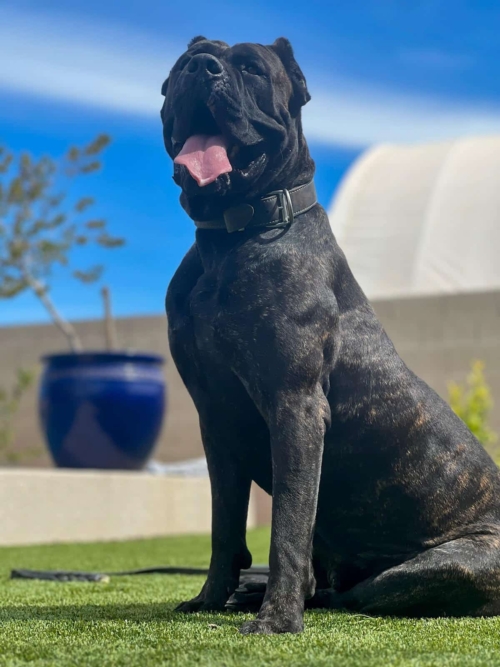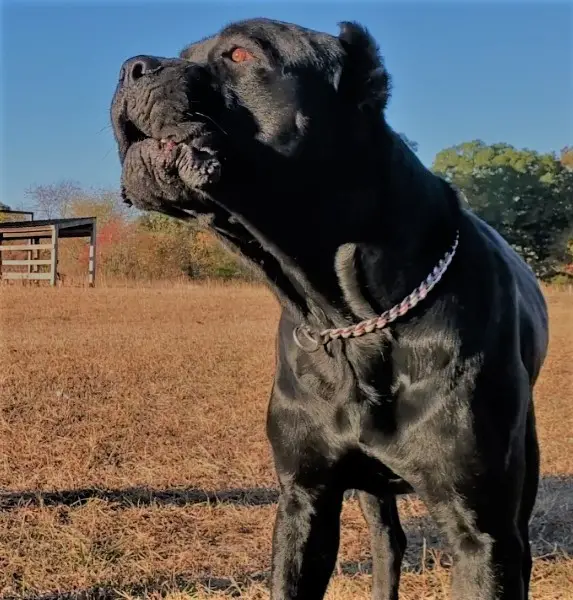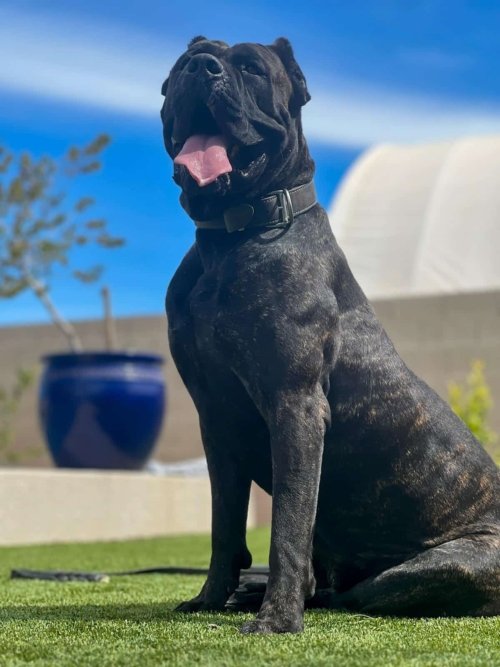When do cane corsos become protective? These magnificent Italian mastiffs are known for their loyalty and protective instincts, but at what age do they start exhibiting these traits? It may surprise you to learn that cane corsos can show signs of protectiveness as early as 8-12 weeks old. That’s right, even as puppies, they are already developing their natural instinct to guard and protect their loved ones.
The protective nature of cane corsos can be traced back to their history as guardian dogs. Originally bred to protect livestock, properties, and families, these dogs have a strong instinct to defend their pack. In fact, it is estimated that around 90% of cane corso owners report their dogs being naturally protective. This level of loyalty and protectiveness is what makes cane corsos such wonderful companions and guardians, always ready to stand by their loved ones’ side.
Cane Corsos typically become protective around 1 to 2 years of age. As they reach adulthood, their protective instincts start to develop naturally. However, it’s important to note that individual temperament can vary. Early socialization and professional training are crucial to shape their protective behavior in a positive way. Providing a secure and loving environment will help them become confident protectors while remaining well-balanced and obedient companions.

When Do Cane Corsos Become Protective?
Cane Corsos are known for their protective nature, but at what age does this temperament start to develop? Understanding when Cane Corsos become protective is essential for owners and potential owners of this breed. In this article, we will explore the stages and factors that contribute to a Cane Corso’s protective instinct.
Early Socialization and Environmental Factors
Early socialization and exposure to various environments play a vital role in the development of a Cane Corso’s protective nature. From a young age, it is crucial to introduce the puppy to different people, animals, and situations to ensure they grow up to be well-rounded and confident adults.
Between the ages of 8 to 16 weeks, Cane Corsos are in their critical socialization period. This is the ideal time to expose them to various stimuli, including different sounds, textures, and experiences. Positive interactions during this period will help shape their protective instincts in a healthy and balanced way.
Owners should prioritize proper socialization by introducing their Cane Corsos to different environments, such as parks, crowded areas, and various social settings. This exposure helps them understand what is normal and what may require their protective response.
Guardian Instincts and Maturity
As Cane Corsos grow older and mature, their protective instincts naturally strengthen. Typically, this breed starts showing signs of increased guarding and protective behavior between the ages of 1 to 2 years. Physical and mental maturity are significant factors that contribute to the development of their guardian instincts.
During this stage, Cane Corsos become more aware of their surroundings and exhibit a heightened sense of responsibility towards their family. They may become more watchful, vocal, and territorial. It is essential for owners to continue providing consistent training, socialization, and reinforcement of appropriate behavior to ensure these instincts are channeled constructively.
Protective Behavior Triggers
Cane Corsos are naturally inclined to be protective, but certain triggers can intensify their instincts. Understanding these triggers can help owners navigate and manage their dog’s behavior effectively.
1. Perceived Threats: Cane Corsos may become protective when they perceive a threat to their family or territory. This can include strangers approaching the house or encroaching on the owner’s personal space.
2. Protective of Their Pack: Cane Corsos are deeply loyal to their family and consider them their pack. They may display protective behavior if they sense anyone or anything posing a potential danger to their loved ones.
3. Lack of Socialization: Insufficient socialization can lead to an overprotective nature in Cane Corsos. If they haven’t been exposed to various people, animals, and environments, they may perceive unfamiliar situations as threats, triggering their protective instincts.
It’s important for owners to strike a balance between allowing their Cane Corsos to express their protective instincts and ensuring they are well-mannered and respectful of others. Proper training, socialization, and positive reinforcement techniques should be employed to shape and manage their protective behavior.
When Do Cane Corsos Become Protective?
In conclusion, the development of a Cane Corso’s protective nature starts during their early socialization period, which is around 8 to 16 weeks of age. However, their protective instincts become more pronounced as they mature, typically between 1 to 2 years old. Various triggers can intensify their protective behavior, including perceived threats to their family or territory and their loyalty towards their pack.
Key Takeaways: When Do Cane Corsos Become Protective?
- Cane Corsos typically start showing protective behaviors around 1 to 2 years of age.
- Early socialization and training play a crucial role in shaping a Cane Corso’s protective instincts.
- Proper supervision and guidance are important to ensure that their protective instincts are channeled appropriately.
- Cane Corsos may become more protective as they mature and form stronger bonds with their families.
- It is important to establish boundaries and teach them to respond to commands to maintain control over their protective instincts.
Frequently Asked Questions
Cane Corsos are known for their protective nature, but at what age does this behavior typically manifest? Here are some commonly asked questions about when cane corsos become protective and their behaviors.
1. At what age do cane corsos start showing protective behavior?
Cane Corsos generally start showing protective behavior around the age of 1 to 2 years. During this stage of their development, they become more aware of their surroundings and their instinct to protect their family intensifies. This is when you may notice them becoming more vigilant and watchful over their owners and territory. However, it is important to note that individual differences and early socialization and training can also play a role in determining when a cane corso becomes protective.
It’s crucial to provide proper socialization and positive training from an early age to ensure that their protective instincts are controlled and directed in a positive manner. This will help them differentiate between real threats and harmless situations, making them reliable and well-behaved protectors.
2. What are the signs of protective behavior in cane corsos?
When cane corsos start exhibiting protective behavior, there are several signs to look out for. These may include:
- Increased alertness and attentiveness
- Standing tall and stiff with a focused gaze
- Deep, rumbling barks or growls
- Protective posturing, such as placing themselves between their family and potential threats
- Showing signs of unease or aggression towards unfamiliar people or animals
These behaviors indicate that a cane corso is exhibiting their protective instincts and is ready to defend their family and territory if necessary. It’s important to provide proper training to channel these behaviors appropriately and ensure that they are well-socialized with different situations and individuals.
3. Can cane corsos become protective without proper training?
Yes, cane corsos have an inherent protective nature, but without proper training, their protective behavior may escalate to become excessive or misdirected. This can lead to aggression towards innocent people or animals, making them potentially dangerous. Early socialization and positive reinforcement training are crucial to help cane corsos understand when protectiveness is required and when it is not. With proper training, they can become reliable and controlled protectors without compromising their natural instincts.
4. How can I encourage protective behavior in my cane corso?
If you want to encourage the natural protective behavior of your cane corso, it’s important to provide them with proper socialization and positive reinforcement training. These steps can help:
- Expose them to different environments, people, and animals from a young age to help them distinguish between genuine threats and harmless situations.
- Focus on obedience training and teaching commands such as “watch” or “guard” to encourage them to be alert and attentive.
- Provide mental stimulation through interactive toys and training exercises to keep their protective instincts sharp.
- Establish clear boundaries and reinforce rules to help them understand their role as protectors and when their protective behavior is appropriate.
By following these guidelines, you can help develop a well-rounded and controlled protective instinct in your cane corso.
5. How can I manage my cane corso’s protective behavior?
To manage your cane corso’s protective behavior effectively, consider the following:
- Continuously socialize them with various people, animals, and environments to promote well-rounded and non-aggressive behavior.
- Provide regular exercise and mental stimulation to prevent boredom, as this can sometimes contribute to overprotective tendencies.
- Enroll them in obedience training classes to strengthen their control and responsiveness.
- Establish clear rules and boundaries and consistently reinforce them to maintain a balanced protective behavior.
- Seek professional help from a qualified dog trainer or behaviorist if you notice any concerning or excessive protective behaviors.
By taking these steps, you can ensure that your cane corso’s protective behavior remains well-managed and safe for everyone involved.

The 5 Top Reasons to Get a Cane Corso
Cane Corsos typically become protective as they mature and develop a strong bond with their family. This usually occurs around 1 to 2 years of age.
Once they reach this stage, Cane Corsos will instinctively feel inclined to protect their loved ones and their territory. However, proper socialization and training are crucial to ensure that their protective instincts are well-balanced and appropriate.
